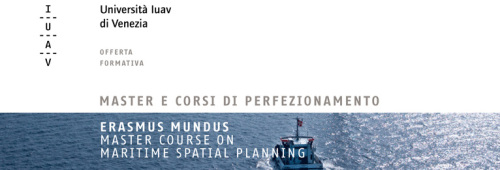
International Master
“Erasmus Mundus Master Course on Maritime Spatial Planning” (EMMCMSP)
Università Iuav di Venezia (coordinator)
University of Sevilla
University of Azores
Deadline of the call for application
20th January 2014
Application
https://www.iuav.it/Didattica1/master/master—I1/Erasmus-Mu/APPLICATIO/index.htm
MSP Consortium
Coordinator: Università Iuav di Venezia
Partners: CORILA (Venice, Italy), UNESCO (Paris, France), Tethys Research Institute (Milan, Italy), Sound Sea (USA), Odessa National Maritime University (Ukraine), Department of Architecture and Engineering (Trieste, Italy), EUCC Mediterranean Centre (Barcelona, Spain), FONAG Institute (Quito, Ecuador), Intermodal Transport Consortium (Croatia), Port Autority of Levante (Bari,Italy).
Scientific coordinators
Università Iuav di Venezia (lead university)
Francesco Musco
e-mail: francesco.musco@iuav.it
Elena Gissi
e-mail: elena.gissi@iuav.it
University of Sevilla
Juan L Suárez de Vivero
e-mail: vivero@us.es
University of Azores
Helena Calado
e-mail: calado@uac.pt
More information EMMCMSP
Secretariat at University Iuav of Venice
Susanna Scarpa
tel: +39 041 257 2322
Maria Gatto
tel: +39 041 257 1720
e-mail: erasmusmundus.msp@iuav.it
Web site
https://www.iuav.it/Didattica1/master/master—I1/Erasmus-Mu/
Erasmus Mundus Master Course on Maritime Spatial Planning (EMMCMSP) is an advanced and professional master program organized on two years, in which three high-rated European universities participate: Università Iuav di Venezia (as coordinator), University of Sevilla, University of Azores. The Master key issues are the policies formulation and planning strategies for maritime space, to improve the management of resources from an environmental, economic, social and legal perspective within the framework of Maritime policies.
Maritime Spatial Planning (MSP) is an innovative instrument based on up-to-date knowledge and technologies to study the planet’s surface, striving to improve the management of global resources.
Though for years the planning system has “turned its back to the sea” it is pivotal in organizing and developing coastal areas beyond the Coastal Zone Management (CZM) approach. The sea is affected by economic, social and environmental changes and, in order to cope with the continuing social and economic evolution, it needs to be included in planning and land management strategies. The transformation of cities on water, coastal area, port and industrial sites should take into account these new challenges which affecting land-water interface.
MSP is a public process of analyzing and allocating the spatial and temporal distribution of human activities in marine areas to achieve ecological, economic, and social objectives. Characteristics of marine spatial planning include ecosystem-based, area-based, integrated, adaptive, strategic and participatory. MSP is a practical way to create and establish a more rational use of marine space and the interactions between its uses, to balance demands for development with the need to protect the environment, and to achieve social and economic objectives.
The aim of the EMMCMSP is to prepare specialists – through a multi-disciplinary background – able to operate both in public institutions as well as independent professionals or researchers as regards the planning, designing and evaluating projects and policies, which consider terrestrial, coastal and marine dimensions, and to manage decision processes towards an adaptive and integrated approach.
The Master added value consists in a crossed-thematical analysis and discussion on several marine contexts (Mediterranean Sea, Baltic and North Sea, Black Sea, Atlantic Ocean), in a comparative analysis and methodological interaction among the institutions involved, together with knowledge transfer to the South of the World.
Master Modules
Module 1_Maritime Planning Experiences: issues and lessons (MPEs)
Module 2_Legal frames: law, rules and regulations for maritime planning, programming, and management (LAW)
Module 3_Maritime geography and ecumene ocean (GEO)
Module 4_Marine and coastal environment (ENV)
Module 5_Spatial analysis, mapping and modelling through Geographical Information Systems and new technologies (GIS)
Module 6_Uses and activities: resources, marine use patterns and environmental changes (USES)
Module 7_Scenarios and strategies of integrated planning (STRATEGIES)
Module 8_Internship (INTERNSHIP)
Module 9_Design for maritime environments: methods and techniques (THESIS LAB)
Layout and Mobility
Relevant and instrumental to the course’s purposes is the mobility on three different contexts:
_Seville and Spain, between the Mediterranean and the Ocean in strict relationship with non-EU countries, as to explore uses and environmental state of internal waters, the territorial sea, the Atlantic exclusive economic zone, the fisheries protection zone in the Mediterranean, and the continental shelf. (First Term, titled “MSP principles and issues”, takes place in Seville from September 2014 to March 2015).
_Oceanic environment of Azores, whose archipelago is a natural laboratory both for human and natural sciences and field work is strongly facilitated. (Second Term, titled “Environments and geographies”, take place in the Universidade dos Açores from March 2015 to August 2015; Third Term, from September 2015 to March 2016, dedicated to individual internship, take place in different countries including marine protected areas in Portugal and Spain, and on other advanced contexts in Europe and worldwide, with the support of MSP Consortium).
_Venice, with a unique lagoon habitat between terrestrial and marine environmental dynamics, within the Adriatic and East Mediterranean basin, “Resilient City” by UNISDR (United Nation International Strategy for Disaster Reduction) for the good progress towards resilience particularly in the protection of the cultural heritage from sea flood disasters; Venice is also part of the Network of North Adriatic Ports (NAPA), which considers Adriatic as a common space between Italy an East Europe countries (Fourth Term, titled “Planning for sustainable use of marine spaces”, takes place in University Iuav of Venice, from March 2015 to August 2015).